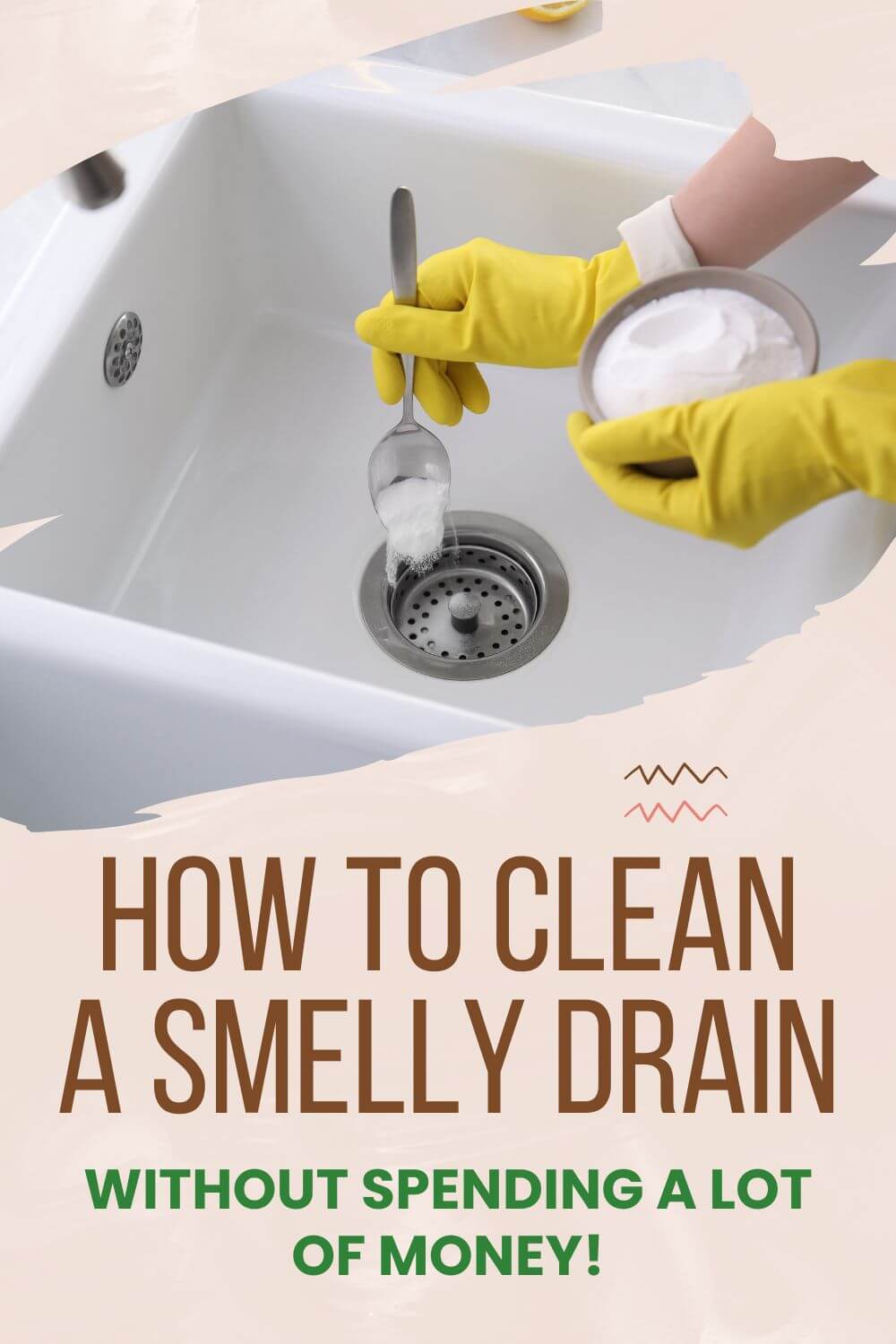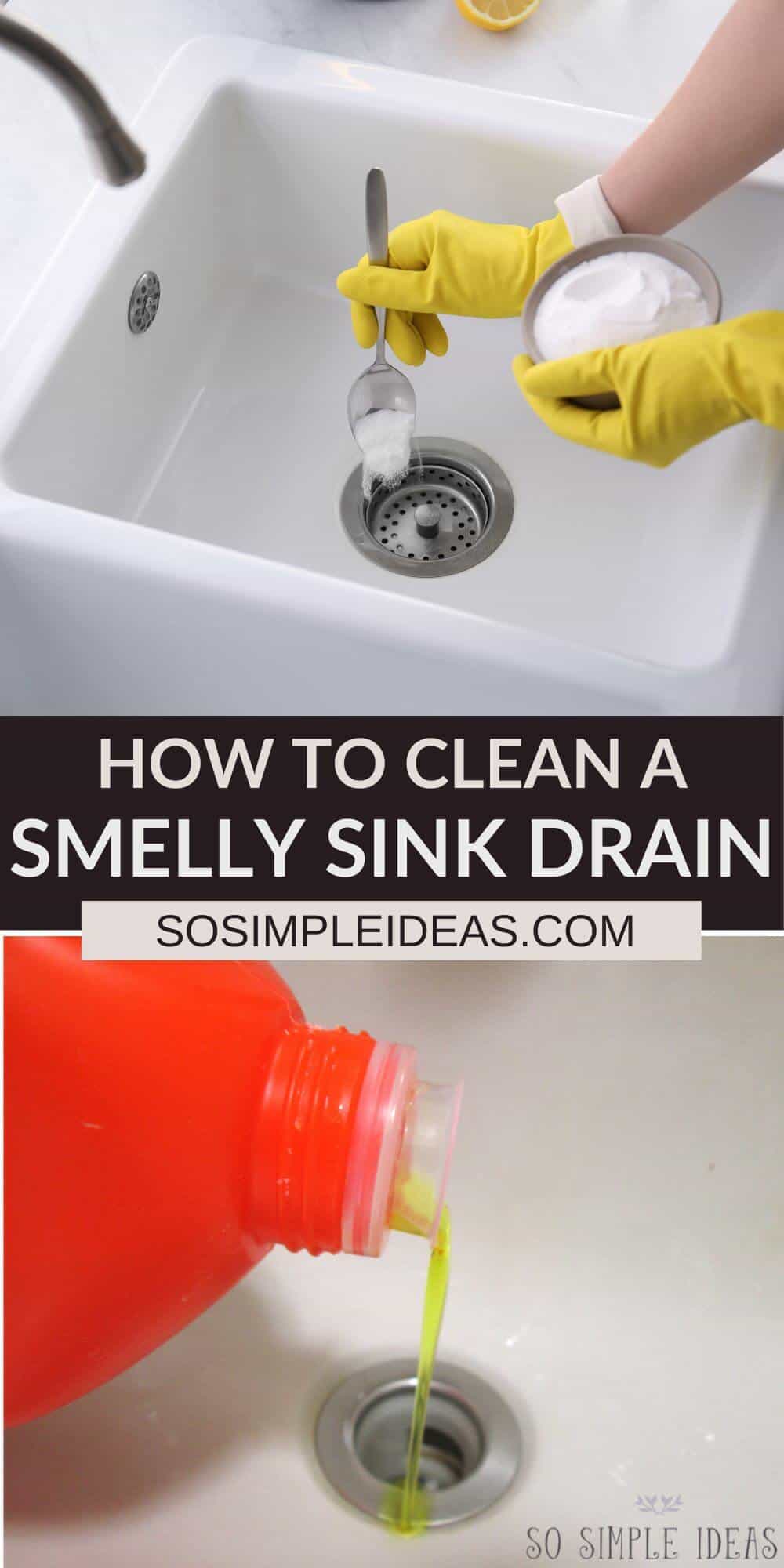A smelly drain can be a real pain in the neck. Not only is it disgusting and unhygienic, but it can also attract flies and other pests. The good news is that there are several ways to clean a smelly sink drain without spending a fortune on expensive drain cleaners.
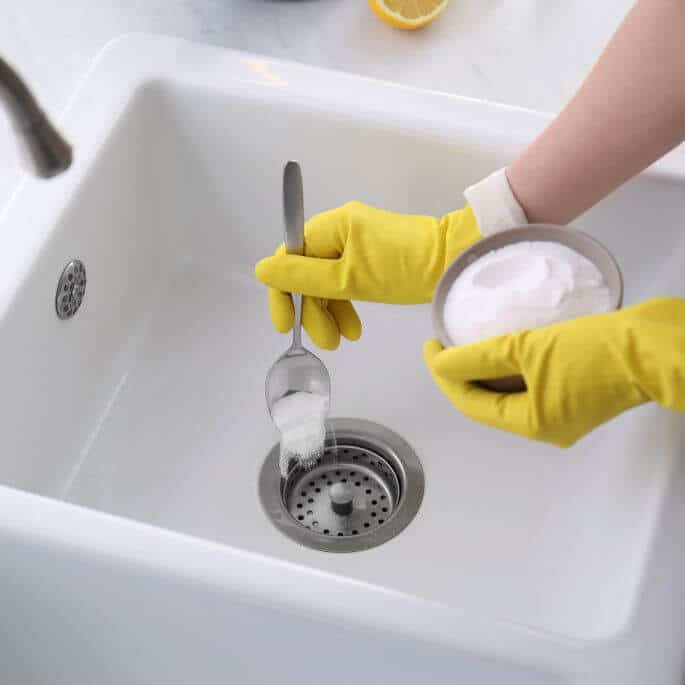
Sink drains can often become smelly due to food and grease buildup. The stench can be overwhelming, making it hard to ignore. Using your nose to detect where the smell is coming from can help you identify and solve the the problem.
In this article, we will show you how to clean sink drain smell and get rid of a smelly drain.
Table of Contents
Causes of smelly drain
There are a few different reasons why your sink drain might smell bad. Sinks often have a bad odor because something has gone wrong inside the pipes. The most common causes of smelly drains are:
- Build-up of food or grease – One of the most common reasons is a build-up of food or grease in the drain. This can happen if you don’t clean your dishes regularly or if you pour grease down the drain. If there is food or grease down in your pipes, it can cause bacteria to grow and create a nasty smell.
- Clogged drains – A clogged sink drain can cause a smelly drain. If you have something stuck in your drain, it may prevent water from flowing freely. This can cause bacteria to grow and create an unpleasant smell.
- Sewer gases – If you smell a foul odour coming from your drains, it’s likely that there’s an empty P-trap in your plumbing. A P-trap is a U-shaped bend in the drainpipe under a sink that prevents sewer gases from entering your home. It connects your sink’s drain to the septic tank or sewers. P-traps should always contain some water.
- Plumbing errors – Another reason for a smelly drain is improper installation of plumbing materials. Some of these materials include PVC pipes, ABS pipes, and copper pipes. Also, odors can seep from a leak or rotting drain tube. To eliminate odors, make sure your plumbing is watertight.
- Using harsh chemicals – Some cleaners contain sulfides that can corrode metal pipes, causing them to break down over time. Overuse of these products will eventually cause your sink to start smelling bad. If you have hard water, consider using a filter to reduce the amount of minerals in your water. This will help your pipes last longer and prevent them from corroding.
If your sink drain smells bad, it’s important to take care of the problem and clean a smelly sink drain as soon as possible. A little bit of attention now can prevent smelly drain problems from getting worse and causing bigger issues down the road.
How to clean a smelly sink drain
When it comes to sinks, one of the most commonly asked questions is how to clean sink drain smell. If you don’t clean your drain regularly, it will start to smell. The reason for this is that food and other debris will build up, creating an ideal environment for bacteria to grow.
You don’t need to call a plumber every time your drain smells. Most of the time, you can get rid of the smell with everyday household items. There are many options that you can use to unclog your drain without harsh chemicals.
Here, we will discuss different methods how to clean smelly sink drain. These methods are inexpensive and simple to use. Try several methods, and combine them if necessary.
Boiling Water and Dish Soap
Hot water and soap removes grease from your dishes, and the same thing can happen when you pour boiling hot water down your smelly drain.
- Boil a pot of water.
- Stir in a few squirts of liquid dish detergent.
- Pour half of it down the drain slowly.
- Let the pipe sit for around five minutes, then rinse it with cold water to solidify and remove any remaining residue.
- Pour the rest of the hot water down the drain to wash away the residue.
Boiling Vinegar
Vinegar is a natural and potent deodorizer. When used in drains, it can dissolve biofilm and other gunk that causes bad smells. Vinegar is also great at dissolving small clogs and can clean smelly sink drains, which are often the cause of odor problems.
- Bring four cups of white vinegar to a boil.
- Pour half down the drain.
- Run cold water for a minute.
- Pour the rest of the hot vinegar down the drain to rinse.
Baking Soda and Vinegar
Mixing baking soda and vinegar together creates a chemical reaction that releases carbon dioxide — this helps lift dirt off surfaces and clean sink drain smell.
- Remove the stopper from the drain.
- Run hot water through the drain for several seconds
- Pour one cup of baking soda down your drain. Follow that with two cups of boiling vinegar.
- Let your mixture fizz and sit for an hour. Afterward, flush the drain with hot tap water.
Plastic Drain Snake
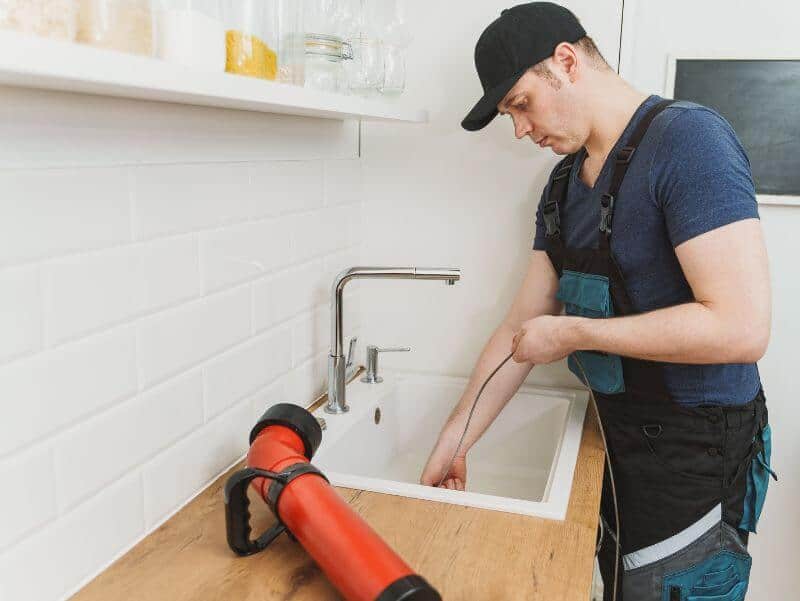
In order to use this method, you’ll need to purchase a plastic drain snake. But if smelly drains are an ongoing issue in your house, the time and money invested in this method might be worth it!
- Feed the snake down the drain by removing the drain plug and carefully lowering it into the hole.
- Hold the snake by its plastic handle. Slowly turn it inside the drain to loosen and remove hair, soap scum, and other debris.
- Pull the snake out of the drain, then remove the debris from the bristles.
- Repeat this process until you’ve cleared all blockages from your pipes.
Clean the P-trap
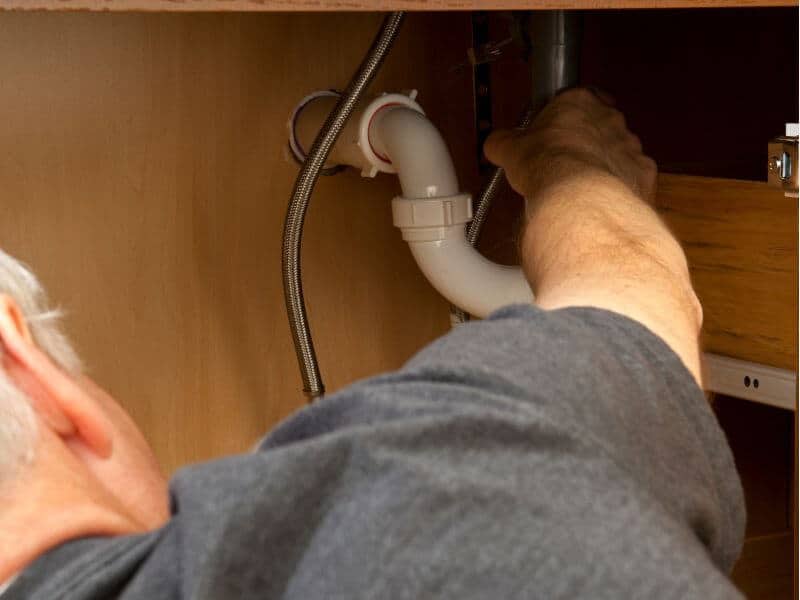
The pipe under your kitchen sink with a U-bend in it is known as a P-trap or sewer gas trap. Keep it full of water at all times, because it will help to prevent sewer gas from escaping through the plughole.
- Put on rubber gloves. Loosen the curved portion of the plumbing beneath the sink using a wrench.
- Empty the trap by pouring out water and any gunk that has built up.
- Clean the P-trap by taking it outside and rinsing it with a garden hose.
- Before using the sink again, make sure that all of the plumbing is reassembled correctly.
Commercial Cleaner
If you find that household drain cleaning products aren’t working, we would recommend trying a stronger solution. There are many different types of cleaners designed to tackle clogs and blockages – the most powerful are corrosive drain cleaners, which can be found in most supermarkets.
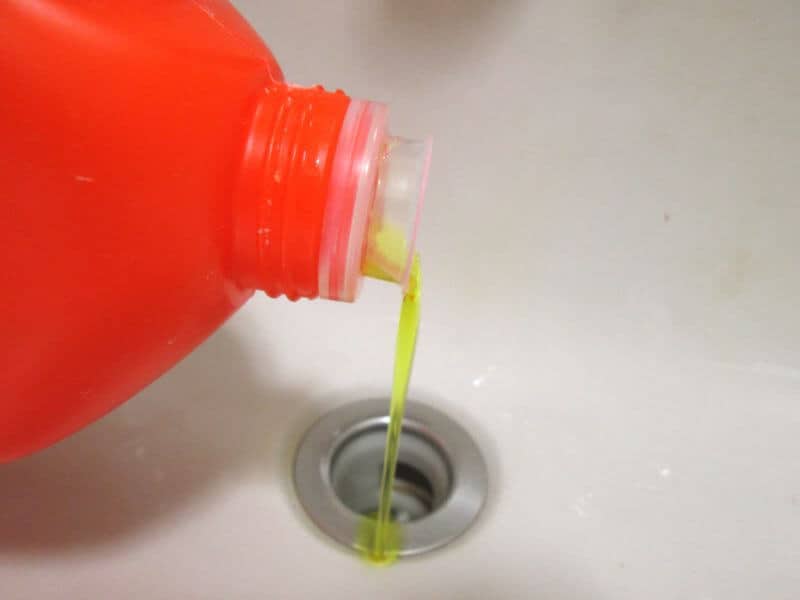
How to prevent smelly drains
Due to their small size and compact structure, drains are much more prone to blockages and clogs developing than the toilet or bathtub. It is for this reason that odors are more commonly found in these areas.
There are a few things you can do to help prevent your sink drain from becoming smelly.
- Regularly pour boiling water down the drain to clear away any food or grease build-up.
- Make sure you don’t put any non-biodegradable materials down the drain, such as paper towels, rags, or plastic bags.
- Dispose of food scraps properly. Don’t put them down your sink drain, as they can clog the pipes and cause a smell.
- Avoid pouring grease down the drain. It solidifies when it cools and will form clogs that can smell up your kitchen or bathroom.
- Try running the water in seldom-used sinks from time to time to keep the P-trap full of water. Adding a few drops of mineral oil once a month will slow evaporation.
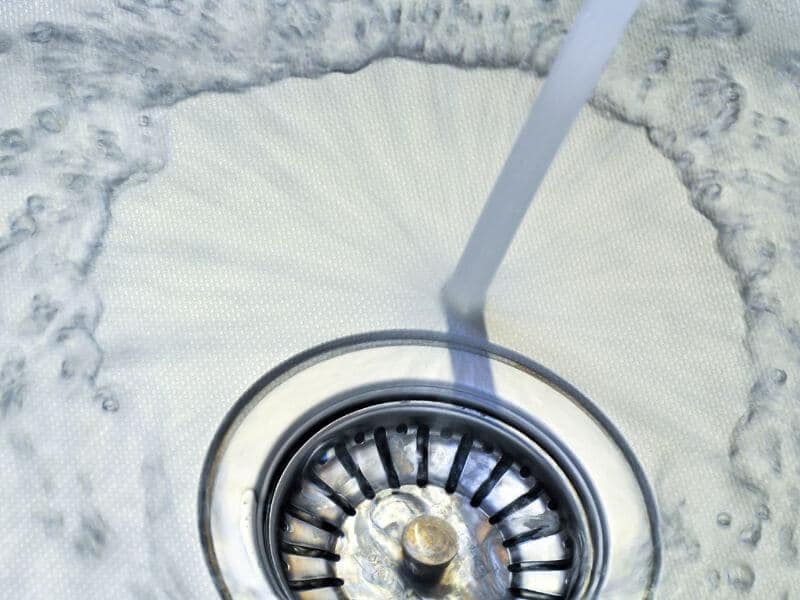
FAQs on how to clean sink drain smell
If you don’t see your question answered below, don’t be afraid to let us know in the comments!
How do you get rid of smelly drains?
To get rid of stinky drains, you can use a variety of methods: pour boiling water or boiling vinegar down the drain, use a combination of baking soda and vinegar, use a plastic drain snake to push the clog through, clean the P-trap by pouring a bleach solution into it, or even using a commercial cleaner. Refer to this article for more information.
Why do my drains smell like sewage?
When your drains smell like sewage, it may be because of trapped food and clogged drains. Sewer gases, plumbing errors, and harsh chemicals can also cause a foul odor. It is important to clean smelly drains because they can cause health problems.
Is it OK to put bleach down the drain?
No. Never pour bleach down the drain because it may cause damage. Bleach combined with other cleaning agents will create toxic gasses. Instead, bleach should be used carefully, sparingly, and properly.
Is baking soda and vinegar safe for pipes?
Absolutely! Baking soda and vinegar can clean pipes effectively, and they are two of the safest household substances to use. They won’t damage plastic pipes and may actually keep them free of clogs.
Other Articles You May Be Interested In
Want to learn some more tips for keeping your home in great shape? Check out our other articles.

